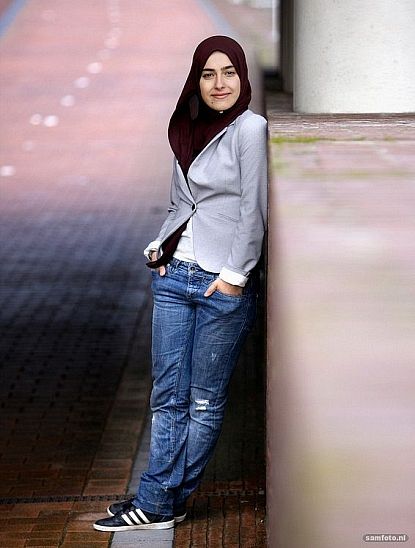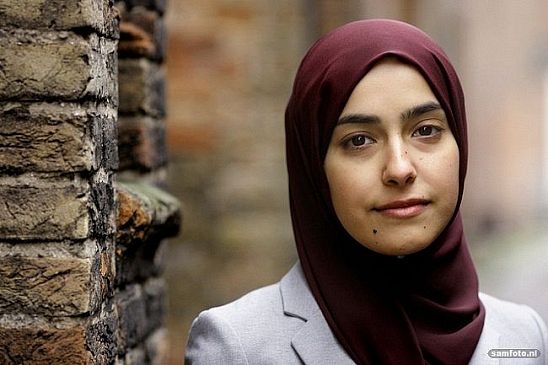Last year, Hanan Al-Kutubi graduated from the Faculty of Applied Sciences with top marks. And in November, she was voted as TU Delft’s Best Graduate of the academic year.
Hanan arrived in the Netherlands as a refugee from Iraq nearly 20 years ago, and is pleased to serve as an example for asylum seekers presently arriving in the country. “I’d be delighted if I could inspire them to realise their full potential.”
You were awarded three accolades for your graduation research: TU Delft’s Best Graduate, the AkzoNobel Graduation Prize for Chemistry and Process Technology and the Unilever Research Prize 2015. And your research also earned you top marks. How does it feel to receive so much recognition?
“It feels good. Before I graduated, it was sometimes difficult to see the light at the end of the tunnel. I worked hard and relished making a contribution to science, but it was tough. I hadn’t expected this much recognition.”
Do you think you could have done things better?
“Looking back now, I see what I could have done better. I think I primarily got full marks because I worked independently. I brought my own idea to the table and was able to solve my own problems.”
Can you explain the most significant outcome of your graduation research?
“I worked with metal organic frameworks, commonly abbreviated as MOFs. That’s extremely porous material, made up of both metal ions and organic molecules. It has a lot of potential applications. You only have to think of one, add MOFs to it and search in Google Scholar, and you’ll find a huge number of hits, from food to catalysis. We investigated a popular MOF, because of it being stable, strong and extremely porous. But it was very difficult to produce the material as a thin, nanostructure film. Someone else had already succeeded in reducing the required synthesis time from 24 hours to 20 minutes, by dissolving organic molecules in zinc oxide. The result was a thick film with either large or small crystals, or no crystals at all. That’s not suitable for nanostructures. We managed to turn this into a thin, regulated film; it’s very porous and has a large surface area. We did this by adding the organic material to the zinc oxide not as a dense load of powder, but as a very thin layer, allowing us to control the synthesis much more precisely. The process naturally still needs to be optimised, but it was a clear step in the right direction.”
Would it not have been an obvious move for you to also conduct any subsequent research?
“I had hoped to do so. As my project was coming to an end, in January 2015, I was already busy considering potential applications and experimenting. But I had to graduate in February. And that’s why my supervisor told me I just had to stop. And it’s true, there comes a time when you need to round things off. It was a shame, but you can’t improve the synthesis and do everything yourself and devise a working application all within seven months. I’m curious to see what will happen with my research. All researchers hope that someone else will come across their idea and use it in future developments.”
You’ve now switched to the Pharmacy Department at the University of Groningen, even though there’s no real link with your research. How did you end up there?
“My current supervisor and my Master’s thesis supervisor knew each other, that’s essentially how. During my time at TU Delft, I tried to do a lot of work with electrochemistry, and that’s an area I’m returning to now. My project concerns electrochemical nanodevices; electrochemistry, but then at a minute scale. My work at TU Delft was applied: I made an existing process quicker, more efficient and more accessible. I was working in a broad field. I’m now focused on fundamental research. Our department doesn’t really concentrate on pharmacy, but more on analysis, with application in the pharmaceutical field. If an application is indeed developed for my research, it will still take a good many years.”
Is it important to you that such an application is developed at some point?
“I’ve had to learn to relinquish that idea. As an engineer, you think from the perspective of a problem. You work towards a solution. But I’m now in fact working towards the problem, instead of the other way around. It’s difficult to master such a different way of thinking. I realise that I shouldn’t cherish too much hope when it comes to the application of my research. I’m intrigued by the pharmaceutical way of thinking; I can learn a lot from it. As a chemical engineer, you think in terms of companies, how your research could benefit them. In the pharmaceutical field, the focus shifts to people. The individual is the starting point for everything.”
You are now a successful researcher. You started life in the Netherlands as a refugee. Do you see yourself as a positive example for children now seeking a better life here?
“It’s good to be able to offer others hope. I’d be delighted if I could inspire refugees to realise their full potential. But it’s not a process I was specifically focused on. It just came about through lots of hard work. If you say “I must focus on realising my full potential” to yourself every day, it can often lead to disappointment.”
At the age of four, you fled Iraq with your parents and made your way to the Netherlands, via Jordan. What can you remember of the trip?
“I can remember Jordan and the flight. I can only remember flashes of Iraq. People had warned us that the Netherlands was very cold, they said it was like the Arctic. So we arrived in thick sweaters and thick coats. But it was June. I didn’t really have to get accustomed to the Netherlands, but that wasn’t the case for my parents. To them, it was a completely different world. Like if we now suddenly went to live in China.”
Why did you come to the Netherlands?
“Back then, you could be granted asylum via the United Nations. I think that’s why we first went to Jordan, to claim asylum with the UN. I don’t know much about the actual reasons. My parents don’t talk about that. I’ve never been back to Iraq. That was out of the question when Saddam was in power. And after that, it wasn’t safe because of the war. My parents have been back a couple of times, though. With the exception of one cousin and one uncle, my whole family still lives there. But I don’t know if I’ll ever want to return, I don’t have many ties there. When I was growing up, we couldn’t get in touch with the family. So I hardly know them.”
Refugees are constantly in the news. What’s your take on it all?
“I’ve always been surprised at how angry people got about refugees. These are people who have fled from terrible things. I think it’s callous to act like they are coming here to get rich. Lots of cities in Syria have been completely destroyed. You perhaps don’t hear much about that in the Netherlands, so part of me understands that people think “It’s not all that bad over there”, but it really is that bad.”
You always lived with your parents in The Hague during your studies. You’ve now moved out, how are you finding it?
“The Hague is a large city with a diverse population. In Groningen, a third of the residents are students. It’s homelier, people are kinder; it gives me a feeling of community. I was a little worried about living by myself in the beginning, but it’s not exactly rocket science. Everyone can do it. I still like seeing my parents, and I travel to The Hague nearly every weekend. The switch from living with your parents to living alone is a big step. When I was living with them, there was always someone to talk to, always activity. It’s difficult for them to let go, I’m still their little girl. But it’s good to experience something else and to learn to live more independently. If I ever do a post-doc overseas and had only previously lived with my parents, it would probably be a lot harder.”
In their first year, doctoral candidates often struggle to find their way. Is this something you recognise?
“During the first six months, I was always thinking: “How should I proceed; how can I ensure that this project captures my imagination, that it will enable me to explore my ideas and interests?” It was certainly a case of finding my way. Now I’ve got it sorted. But however well you plan, you can’t plan for the unexpected. I recently spent time in the lab manufacturing chips. That took longer than I had anticipated. You’re new, and you don’t know how things work in practice, how long things can take. It’s difficult not to be too ambitious.”
Was your plan always to take your doctorate?
“After my Bachelor’s degree, I opted for chemical engineering with the thought at the back of my mind that I didn’t want to become a researcher. When I saw doctoral candidates, they were always so tired. I’d ask them how it was going, and the first thing that they’d say was that studying for a PhD was very difficult and very hard work. That doesn’t really spur you on, I wasn’t after such a tough life. That’s until I discovered how much I enjoy researching. And it’s not all that bad. If I had become an engineer, it would probably have been just as difficult. Having said that, I am pretty tired. That’s why I’m trying to cut down my working hours. I’d usually go home in the evening and carry on working. That’s fine for seven months, but doing that for four years isn’t exactly healthy. I now go into town more often, go out for dinner with colleagues, get to know people. Slowly but surely, my life outside of the university is taking shape.”


CV
Hanan Al-Kutubi (25) put in such a good performance in her chemistry secondary school leaving examination, that the Royal Netherlands Chemical Society recognised her achievement with an award. Nevertheless, she initially chose to study architecture. This turned out to be a poor choice, something that Hanan put right after just a month. She switched to molecular science and technology, focusing on both elements of the programme (chemistry and technology). In 2015, Hanan became the first Master’s student in a decade to graduate with full marks. She was selected as Best Graduate of the Faculty of Applied Sciences, and subsequently of TU Delft as a whole. Awards from both AkzoNobel and Unilever followed. Meanwhile, in April 2015, Hanan started her doctoral research at the University of Groningen. She’s keeping her options open about what she’ll do after that: “I’d like to do a post-doc and become a professor, but securing a place isn’t easy. There’s also the consideration that doing a post-doc can affect your chances in the commercial sector. There are very few companies looking for someone with a post-doc. I haven’t yet decided what I’ll do.”



Comments are closed.